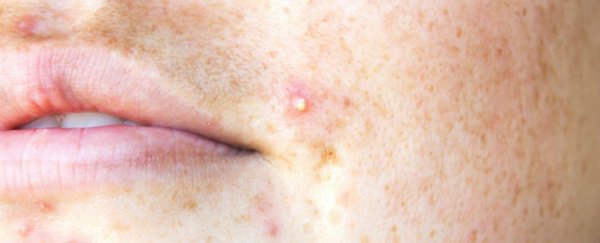Vitamin B12 - found in many meat and dairy products and taken as a supplement for better brain function and to stave off anaemia - might alter the genetic make-up of facial bacteria, promoting rapid inflammation that's been linked to the formation of pimples, according to a 2015 study.
As many poor souls are well aware, acne isn't just for teenagers. In fact, it affects most of us at some point in our lives, with an estimated 80 percent of people between the ages of 11 and 30 around the world experiencing a breakout at some point.
The unluckiest of us will have to deal with the unsightly lumps and bumps well into our forties and fifties, and the worst part is that despite being an incredibly common affliction, scientists don't actually know much about what causes acne and how to prevent or treat it.
To investigate, Huiying Li, a molecular pharmacologist at the University of California-Los Angeles, and her team decided to focus on high levels of B12 as a possible culprit, based on research from the past six decades that's linked it to higher instances of the condition.
"It has been reported several times that people who take B12 develop acne," she told Arielle Duhaime-Ross at The Verge back in 2015.
The first thing they did was identify the molecular pathway that produces vitamin B12 in the skin bacterium Propionibacterium acnes, and compared it in people with good skin, and people with acne-prone skin.
They found that the vitamin B12 biosynthesis pathway in P. acnes was significantly down-regulated in the acne patients as compared to the patients with healthy skin.
Next, they wanted to test the effects of an increased intake of B12 from eternal sources on the levels of naturally produced B12 in these skin bacteria. They gathered 10 volunteers with clear, healthy skin, and asked them to receive a vitamin B12 injection.
As Jennifer Abbasi reported at LiveScience, "The researchers confirmed that the B12 supplement repressed the expression of genes in P. acnes involved in synthesising the vitamin. In fact, the expression of those genes was lowered to levels similar to those of acne patients."
So it looks like by intaking extra vitamin B12, we could be prompting the bacteria in our skin to slow down on their production of it, which leads to an imbalance that could heighten our risk of developing acne.
According to the paper, which was published in Science Translational Medicine, one of the clear-skinned participants ending up developing acne one week after receiving the vitamin B12 injection.
When Li and her team examined the gene-expression in their P. acnes bacteria, they found that it had gone from looking like that of the other clear-skinned participants to that of their acne-affected volunteers 14 days after the injection.
The team followed up the finding by performing lab tests in which vitamin B12 was added to P. acnes bacteria.
The bacteria responded by producing compounds called porphyrins, LiveScience reported, which are known to promote the kind of inflammation that previous research has linked to the appearance of severe acne.
"It's exciting that we found that the potential link between B12 and acne is through the skin bacteria," Li told Duhaime-Ross at The Verge.
Now, before you decide to stop taking supplements and cut down on anything rich in vitamin B12, such as fish, meat, poultry, eggs, and milk - you know, all the delicious things - remember that this is a small study, and there's not a whole lot to go on yet, except that vitamin B12 looks like an intriguing candidate for further research.
The study was published in Science Translational Medicine.
A version of this article was first published in June 2015.
